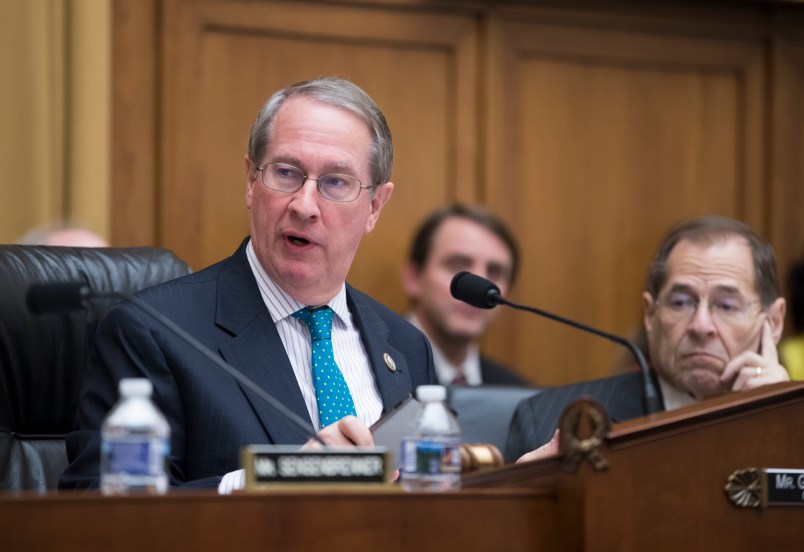Multiple witnesses appeared in front of a House Judiciary subcommittee hearing Friday to testify in favor or against the addition of a citizenship question to the 2020 census — a Trump administration move that is roiling the civil rights community and prompting numerous lawsuits.
But the Republican lawmakers who showed up to participate in the hearing seemed most interested in speaking to Alabama Attorney General Steve Marshall, who is bringing a lawsuit seeking to alter how the U.S. congressional map is drawn to diminish the political power of immigrant-friendly states.
His lawsuit is parallel to the push for a census citizenship question, but if successful, could have just as drastic of an effect, if not more. Whereas the Trump administration has claimed it needs census citizenship data for Voting Rights Act enforcement (a claim viewed skeptically by voting rights activists), the Alabama lawsuit explicitly seeks to exclude undocumented immigrants from how U.S. congressional seats are apportioned.
To do so, it would require the Census Bureau adding another question seeking to know immigrants’ legal status, beyond the citizenship question, which civil right rights groups fear will chill immigrant participation on the survey.
“Not only would we want to know your citizenship, but also whether or not, if you’re here illegally, have you overstayed your welcome, in essence the status you were granted? Or if you’ve ever been granted [legal status] in the first place,” Marshall said Friday. “And by having that information, it would allow us to do an appropriate apportionment of those congressional representatives and the Electoral College.”
House Judiciary Republicans, including Committee Chairman Bob Goodlatte, seemed sympathetic — and even supportive — of Alabama’s idea.
“What do you believe is Congress’ role in rectifying the concern that you raised in the state’s lawsuit?” Goodlatte asked.
Marshall claims that the current system of including undocumented immigrants in congressional apportionment is incentivizing sanctuary cities. Rep. Steve King (R-IA), the anti-immigrant zealot who chairs the subcommittee hosting the hearing, not surprisingly backed the claim. He argued Friday that lawmakers from districts with a disproportionately highly presence of undocumented immigrants may be biased towards supporting pro-immigrant and sanctuary city policies, “even when the policy preferences of illegal aliens may be very different than those of citizens and legal immigrants.”
Rep. Karen Handel (R-GA), whose red state is gradually turning purple as its immigrant population grows, suggested in her questions for Marshall that all noncitizens — not just undocumented immigrants — should be excluded from congressional apportionment.
“If noncitizens are ineligible to vote in a federal election, why would noncitizens be included in the formula for congressional apportionment?” she said.
The primary fear that civil rights groups have expressed about Trump’s move to add a citizenship question to the Census is that it will discourage immigrants, including legal immigrants, from participating in the decennial count and areas with large immigrant populations will suffer an undercount. But there have also been hints Republicans will seek to use the data to exclude noncitizens when drawing legislative districts. Kansas Secretary of State Kris Kobach has floated the idea, and Missouri GOP lawmakers even tried unsuccessfully to put such a requirement up as a state ballot initiative.
The Missouri effort — and the 2016 Supreme Court case Evenwel v. Abbot — focused on state legislative districts.
Alabama’s lawsuit — while seeking to exclude a smaller portion of the immigrant population (noncitizens in the U.S. legally would not be excluded under its proposed scheme) — is arguably a bolder power grab, since it targets the U.S. congressional map and the Electoral College.
The Constitution explicitly calls for congressional appropriation based on “the whole number of persons in each State” — leading many legal scholars to believe the congressional apportionment issue is a far less open question than whether state legislative district drawing can exclude noncitizens. Republicans have proposed legislation to amend the Constitution to exclude noncitizens from congressional apportionment.
The U.S. Supreme Court in its unanimous Evenwel opinion, rejected that idea that states be required to exclude noncitizens when drawing state legislative districts.
Rep. Jamie Raskin (D-MD) brought up the Evenwel opinion when questioning Marshall Friday to ask how he squared his request with that court’s decision.
The House Judiciary Republicans at the hearing showed no such skepticism.







The last gasp of a dying political party…
Rest in Hell…
C’mon, people, nothing to see here … they’re just trying to return power to the people the Framers had in mind when they set up our country.
You know … white male property-owning citizens.
Complete with that original definition of “property.”
There are days when Jim Crow takes off the sheet and you wonder if we’re going to need a war of violence to overthrow these bastards, a war that will destroy the nation we love. They’re hopeless.
I guess it’s back to taxation without representation. Well, the Backwards Party is that way.
Surely, we can agree to compromise on this.
Maybe count some people as only three-fifths of a person.
Something like that.